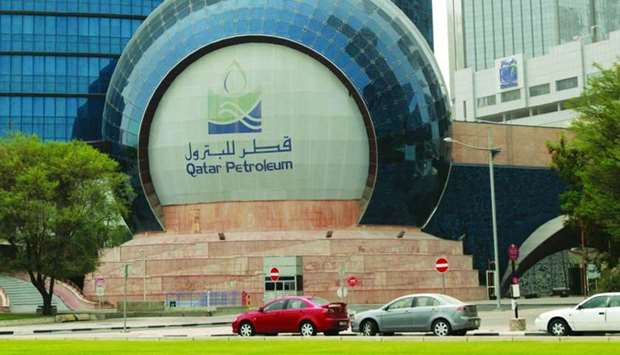*Qatar energy sector 2019 review
Qatar’s recent decision to scale up its liquefied natural gas (LNG) production capacity to 126mn tonnes per year (tpy) by 2027 is among the major strides the country’s energy sector made in 2019.
The huge production boost by 64% (on the current 77mn tpy) will have a multiplier effect on the national economy over the coming decades and help Qatar consolidate its position as the world’s top transhipper and producer of liquefied natural gas.
Effectively, Qatar’s LNG production capacity will exceed 142mn tpy annually (by 2027), when the output from the Golden Pass LNG export facility located in Sabine Pass, Texas, is also accounted for.
The Golden Pass LNG export project, which is owned by the Golden Pass Products, is a joint venture of QP (70%) and ExxonMobil (30%).
Overall, Qatar’s hydrocarbon production will account for nearly 6.7mn barrels oil equivalent per day with the LNG production capacity boost to 142mn tpy.
The expansion of Qatar’s LNG facilities is considered as the world’s largest and one of the energy sector’s most lucrative projects.
The country may also maintain its position as the holder of the largest non-associated gas reserves in the world for the foreseeable future by establishing confirmed gas reserves of 1,760tn cu ft at the North Field.
This is in addition to more than 70bn barrels of condensates, and massive quantities of LPG, ethane, and helium, a huge quantity by any standard.
New studies have revealed that the North Field’s productive layers extend well into Qatari land in Ras Laffan, paving the way for a new LNG production project in the north of Qatar.
Last month, QP completed fabrication of the first two jackets required for offshore facilities as part of its North Field Expansion (NFE) Project.
The NFE project's Engineering, Procurement, Construction and Installation contract for the jackets was awarded to McDermott in April this year.
McDermott was also awarded the Front End Engineering and Design contract for the associated topsides and pipelines in May.
During the past two years, Qatar Petroleum worked diligently to determine the degree to which the North Field extends towards the south west, as well as the possibility of production from Qatar’s northern coastal onshore areas.
The year saw the world’s top LNG producer and exporter Qatargas achieving the “best in class” reliability performance of 98.8%. The company’s production was also on target in 2019.
Qatargas maintained a “strong environmental and safety performance” as it achieved a flaring rate of 0.38 against a target of 0.44 this year, thanks to a successful flare reduction project whereas the greenhouse gas (GHG) emission rate showed 0.35 against a target of 0.42.
In the year under review, Laffan Refinery 1 marked 10 years of operation without any Lost Time Incident (LTI) and the company successfully completed two key environmental projects — the Waste Materials Management facility and the Treated Industrial and Process Water facility.
Laffan Refinery, operated by Qatargas, achieved a “strong reliability” of 98.6%, well ahead of the current year targets.
Qatar's first condensate refinery, Laffan Refinery, started production in September 2009.
The refinery processes untreated gas condensate to produce LPG, naphtha, jet fuel and gas oil.
Another major accomplishment this year was the golden jubilee of Qatar Fertiliser Company (Qafco).
Qafco has a total production capacity of 3.8mn tonnes of ammonia and 5.6mn tonnes of urea annually. The fertiliser major has become the largest single-site producer of ammonia and urea in the world through six export-oriented integrated production lines.
The company was the “first building block” of Mesaieed Industrial City, the first Qatari petrochemical manufacturer to export its products from Mesaieed ports to the world, and the first company to train and develop Qatari capabilities to work in and lead the petrochemical sector.
Qafco was also the “cornerstone” of the establishment of Industries Qatar, the largest listed company on the Qatari stock market. This listing has benefited the national economy.
This month Qatar Petroleum announced the implementation of the ‘In-Country Value Policy’ in the energy sector (starting January 2020) through ‘Tawteen’, the localisation programme for services and industries in Qatar’s energy sector.
The ICV Policy will impact the tendering and awarding process, where suppliers and contractors who are contributing the most to the local economy will acquire a commercial advantage.
Launched in February, Tawteen received hundreds of applications through its investor portal from local investors and leading global suppliers for about 100 new investment opportunities it offers in various fields, including engineering services, maintenance, repair & overhaul (MRO), digital technologies, subsurface operations, chemicals and metals, as well as light equipment, business services and other services across the energy sector supply chain.
Another major Qatari company, Qatar Steel, was recently accredited with an exclusive recognition by TURKAK (Turkish Accreditation Institution, Turkey), for chemical and mechanical testing of carbon steel used for reinforcement of concrete in Qatar and around the world.
In addition, Qatar Steel is the first steel company to achieve a performance rating of ‘very good’ for the prestigious BES 6001 Responsible Sourcing Certification from CARES UK after the successful reassessment audit conducted along with CARES SCS Scheme Surveillance Audit.
Qatar Chemical Company (Q-Chem) recently received certification on the latest ISO Standard for occupational health and safety management system — ISO 45001:2018 — and re-certification on other internationally recognised standards.
At the ‘Mustaqbalna’ event earlier this month, HE the Minister of State for Energy Affairs Saad bin Sherida al-Kaabi, also the President and CEO of Qatar of Petroleum, had emphasised that Qatarisation was one of QP’s top priorities.
“Our corporate strategy is focused on developing a highly capable and motivated workforce across the whole of QP with special emphasis on Qatari development,” al-Kaabi noted.


